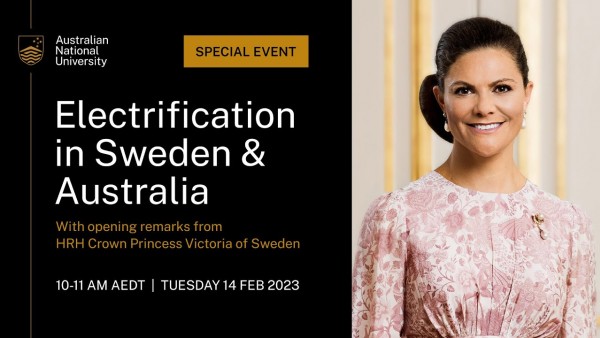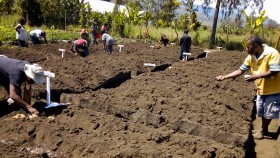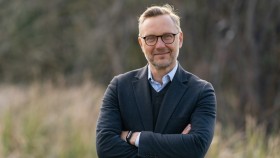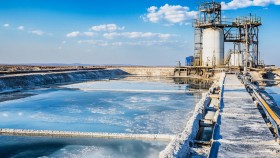Electrification in Sweden and Australia
Her Royal Highness Crown Princess Victoria of Sweden delivered a special address this morning at The Australian National University to open the panel event on Electrification in Sweden and Australia.
Australian and Swedish experts shared their views on best practices to fully leverage electrification on the path to net-zero. Australia and Sweden share commitments to achieve net-zero emissions by 2050 and stand by the letter and spirit of the Paris Agreement.
In her opening remarks, HRH Crown Princess Victoria noted "we are at a junction that requires us to find solutions for transforming the way we produce and consume energy. I am proud to say that we have a large number of Swedish companies and research institutes working towards this end.
They are at the forefront leading the way in developing clean and competitive energy solutions. I also know their interest is great in collaborating with Australian partners and contributing to Australia's' energy projects. I hope that today's seminar can be a stepping stone towards enhancing this collaboration. We are facing that global challenge together and we will master them through collaboration."
Vice-Chancellor Professor Brian Schmidt said ANU has a unique role as Australia's only national university. "We are a research-intensive campus and our remit is to undertake research that benefits all Australians and undeniably climate change is one of the most pressing challenges to humanity's existence."
"Whilst currently at an early stage, electrification is accelerating rapidly and it is expected that by 2030 over 80 per cent of Australia's power will be renewable and that green electricity will increasingly power Australia's transport and industrial systems and our homes."
Johan Forssell, Minister for International Development Cooperation and Foreign Trade, Sweden spoke about the "problematic" dependencies that many countries across Europe are facing for their energy supply.
He expressed the importance of free trade flows with like-minded partners, as opposed to countries that don't share the same fundamental values of democracy and freedom of speech and where a dependency could be formed.
"In today's world, trade is not only about figures and economic growth and jobs, it is about security."
Another aspect to the conversation was the challenge Australia is facing in accelerating electrification to meet the ambitious goals of the new government.
Matthew Ryan, Assistant Secretary Transport branch, Department of Climate Change, Energy & Disaster Solutions, said the uptake rate of EVs is around three per cent of new car sales, while Sweden is at 50 per cent.
He added that infrastructure-wise, Australia is still not quite ready - with around 5000 public charging points being rolled out compared to Sweden's 16-17,000.
"We can learn a lot from Sweden in terms of how we can drive demand, increase supply and get the infrastructure we need," he said.
One of the people on the forefront of this green transition in Australia is Associate Professor Marnie Shaw who is the Research Leader for the ANU Battery Storage and Grid Integration Program. She was one of the expert panellists and she spoke about the pilot program she is currently leading with the ACT government.
"Vehicle to grid is a new technology which allows us to use electric vehicles to inject power into the grid for the rare times we need that grid support. This can be for things like backup power. For example, in Newcastle they have electrified fire trucks that can go out to disaster locations and provide backup power for those affected communities.
The trial here at ANU is an Australian first. We are trialling this technology and also trying to understand the people side of it. What do people want and what do people expect of this technology? What are the benefits and barriers? We need to address the issues and develop the market opportunities to make this a viable technology."
Moderator Professor Mark Howden, Director, ANU Institute for Climate, Energy & Disaster Solutions (ICEDS) and Vice-Chair, Working Group II, Intergovernmental Panel on Climate Change (IPCC), reiterated the importance of working with engineers who also understand social science.
"It's an area that we need to consider - how do we build a workforce that's appropriately skilled for the jobs of the future?"
Marnie encouraged young students to consider a career in engineering, social science, or computer science, so that they could contribute to working on this problem.
First year student Ollie Grindlay spent his second day as an ANU student at the event and said that it was eye opening to see the difference between Sweden and Australia's electrical energy policy and how high Sweden's uptake of EVs is in comparison to Australia.
"Personally, as a student I think the price point of electric vehicles is really high, it's almost impossible to purchase an EV in my situation. I found it really interesting how that contrasted to Sweden where the price entry is much better."
There were a few Swedish exchange students at the event, eager to see their country work together with ANU and to get a glimpse of the Crown Princess.
Hedda Cederqvist reflected on how human behaviour is factored into the move toward electrification, something that Associate Professor Shaw discussed.
Andrea Henriksson said that trust and accountability were very important as companies make commitments towards sustainability and electrification.
"Young people want to see companies be transparent and clearly set out their goals...and how they'll reach them...I think the climate questions sometimes feel hopeless and we'd like to see some concrete action plans that are happening sooner rather than later."
The event was presented by the ANU Institute for Climate, Energy and Disaster Solutions (ICEDS) and the Embassy of Sweden in Australia. ICEDS was launched in 2021 and consists of over 570 researchers from across the University working together to find solutions across disciplines.











